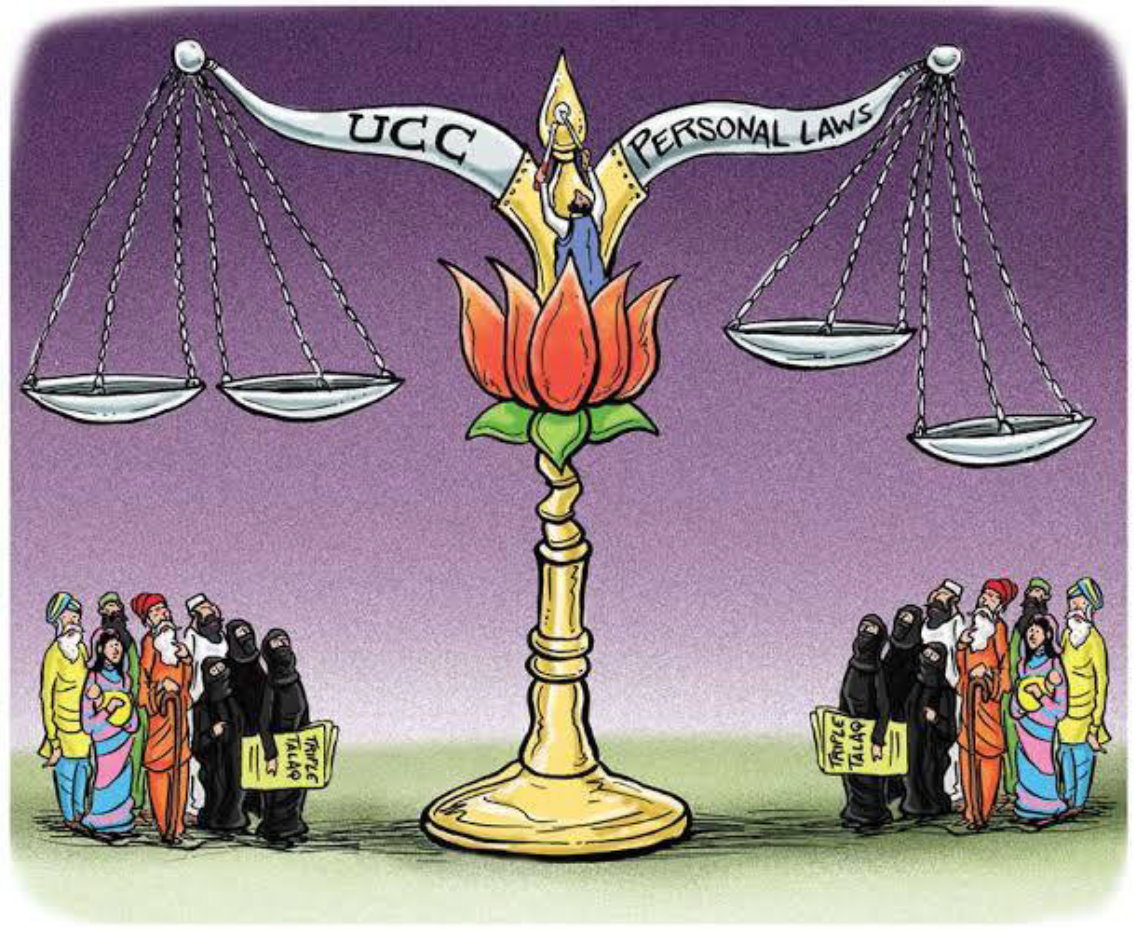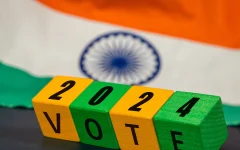The Uniform Civil Code: A Step Toward Equality or A Tool for Majoritarian Control?
May 5, 2025 2025-05-05 9:55The Uniform Civil Code: A Step Toward Equality or A Tool for Majoritarian Control?

The Uniform Civil Code: A Step Toward Equality or A Tool for Majoritarian Control?
By: Anaaya Wahi
Abstract
This essay critically examines the ongoing discussion regarding India’s proposed Uniform Civil Code (UCC) to assess whether it promotes equality or poses a risk to majoritarian values. It emphasizes issues related to cultural diversity, minority rights, and gender justice, drawing on the example of Goa and current state efforts. It argues that eliminating discriminatory practices in personal laws is the best way to achieve true equality rather than enforcing uniformity. It also cautions that a UCC could jeopardize India’s pluralism and constitutional liberties in the absence of broad consensus.
Introduction: The UCC and India’s Diversity
The Uniform Civil Code (UCC) has been a cause for various debates all over the country, and I find myself wondering if this extensive reform is indeed about equality or just a mere means of enforcing societal norms. From cultural norms to religious traditions, India’s diversity is what makes it different and beautiful. The foundations of the country are threatened by the prospect of imposing universally applicable rules. A standard set of laws may appear to be a logical starting point for achieving justice. However, the more I think about it, the more I see that equality isn’t automatically achieved by standardizing everything. The major issue lies in the biased practices embedded within different personal laws, not in their existence per se. Instead of disposing of entire traditions in lieu of uniformity, wouldn’t it make more sense to amend such inequalities present within them?
The case of Goa: A mixed example
Goa is frequently used as an example for the UCC. Although Goa does adhere to the Portuguese Civil Code 1867, many are unaware that there are still certain deviations. This raises the question: why are we not seeking methods to change unjust behaviour without demolishing communal identities if the goal is equality? Moreover, even after the enforcement of the code, gender discrimination persists in Goa. For example, as per the Portuguese civil code that is still prevalent in Goa, a married woman cannot make use of shared property without her husband’s permission- showing that uniformity does not always correlate to justice. (Law Commission of India, 2018).
Freedom, Control, and the Constitution
The most concerning point of all is the possibility that the UCC can be used as a way of control rather than a way of advancement. It feels like personal freedom is being violated when the state determines which traditions are acceptable and which are not. Article 25 of the Constitution, which protects one’s freedom to practice any religious beliefs, could be easily violated by this. Personal laws reflect how societies have lived and changed over the years; they are more than just legal codes. People may feel helpless and estranged if that is taken away for the sake of development.
Emotional and Cultural Attachments
Furthermore, it appears that the UCC’s constraints ignore the emotional attachment that people have to their traditions. The majority of the population sees personal laws as a crucial part of who they are, rather than just being legal frameworks. Consider a woman from Northeastern tribal community whose inheritance rights are protected by conventional norms. She might be refused those safeguards by a generally accepted code, which would force her to follow a framework that isn’t suited to her own situation. Quantifying the emotional and psychological effects of losing that connection merely in terms of the law is completely impossible.
Minority Rights and the Risk of Majoritarianism
Additionally, I cannot overlook the possible unequal impact this policy might have on minority groups. Given India’s vast history of inter-communal conflict, there is reason to be concerned that a universal rule could largely favour the majority. Minority voices are at risk of being further excluded and violated when the state begins to dictate which customs are acceptable. Concerns have already been raised by the current UCC proposal in Madhya Pradesh, which raises questions about whose traditions will be kept and whose will be lost (Hindustan Times). I find this power imbalance highly concerning, particularly given how UCC debate often labels some traditions as modern while others as outdated. For example, Hindu Marriage Act of 1955, promotes monogamy and views it as modern, whereas polygamy in Islamic law is considered outdated. This difference brings up questions as to how UCC discriminates against cultural traditions. (Law Commission of India,2018)
Gender Equality: Reform or Uniformity?
If gender equality is the main goal of the UCC, then particular changes are the answer. Inclusive changes could be made gradually by engaging minority groups, women’s organizations, and community leaders. For instance, Women’s Reservation Bill (2023) was passed mandating a third of seats in the Lok Sabha, Delhi Legislative Assembly and the State Legislative assemblies be rightfully set aside for women after decades of campaigning by women’s rights organisations (Carnegie Endowment for International Peace, 2023). The 2005 modifications to the Hindu Succession Act, that gave daughters equal rights to inherit family property, is one example of a successful legal reform in India. Why aren’t various personal laws subjected to the same logic?
Philosophical Perspectives and Political Timing
To me, equality stands for a society in which every person has the freedom to make their own decisions, whether those decisions involve complying with or departing from religious traditions. Implementing a uniform rule without taking into consideration the underlying reason of inequality seems like a shortcut that prioritising legal uniformity over true equality. This viewpoint aligns with the ethos of philosophers like John Stuart Mill (On Liberty, 1859) who highlighted that individual freedom is the sole basis of an ideal society and not state imposed monotony. In a similar manner, Amartya Sen (Development as Freedom, 1999) claims that strengthening the meaningful decision making of people is the path to true growth instead of enforcing strict legal conducts. Moreover, I believe the UCC debate’s timing is more political than being focused on social justice. India is at a crucial moment where women’s safety and economic injustice require immediate actions. Shouldn’t these urgent matters hold priority over a project that could cause community division?
Conclusion: Respecting Diversity for True Equality
At the present moment, it seems that the UCC is more concerned with maintaining legal uniformity than bringing about true inclusivity. The path to true growth is respecting differences while making sure nobody is left behind. We should be creating a system that ensures everyone has choice, respect, and dignity rather than imposing conformity. India’s variety has always been its greatest asset. Why should our individuality be sacrificed in the name of equality?
References:
Carnegie Endowment for International Peace. India’s Women’s Reservation Bill: A Step Towards Political Inclusion. 2023. https://carnegieendowment.org/2023/09/21/india-s-women-s-reservation-bill-step-towards-political-inclusion-pub-90567.
Government of India. The Hindu Succession (Amendment) Act, 2005. https://legislative.gov.in/sites/default/files/A2005-39.pdf.
Hindustan Times. “Madhya Pradesh’s UCC Draft: Key Proposals and Debates.” 2025. https://www.hindustantimes.com/india-news/madhya-pradesh-ucc-draft-key-proposals-and-debates-2025-101679002345678.html.
Law Commission of India. Consultation Paper on Reform of Family Law. 2018. https://lawcommissionofindia.nic.in/reports/CPonReformFamilyLaw.pdf.
Mill, John Stuart. On Liberty. 1859. https://www.gutenberg.org/ebooks/34901.
Sen, Amartya. Development as Freedom. Oxford University Press, 1999. https://global.oup.com/academic/product/development-as-freedom-9780192893307.
About the author
Anaaya Wahi is a second year Economics student with a passion for finance, policy, and research. An avid reader and writer, she has extensive experience in content writing, social media management, and graphic design. She enjoys exploring the intersection of economics, finance, policy, and storytelling.






